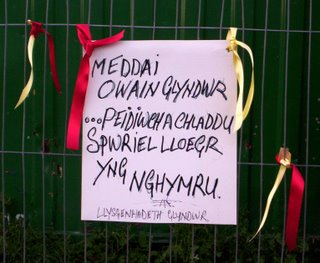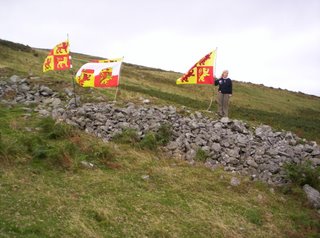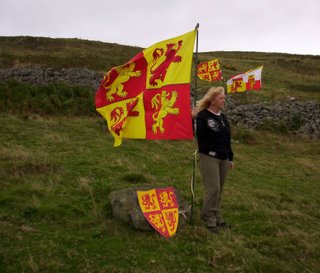HAFOD QUARRY CAMPAIGN – RESISTANCE AGAINST RUBBISH CONTINUES.
OWAIN GLYNDŴR COMMUNICATES
A news &Information Service – please inform us of any Glyndwr interest news.
If using material from this document please quote source.
http://owain-glyndwr-embassyllysgenhadaeth.blogspot.com
www.embassy-glyndwr.co.uk
Tel: 07787926981: E-mail: llysgenhadaeth@ntlworld.com
GLYNDŴR CALL TO ACTION AGAINST ENGLISH RUBBISH DUMPING IN CYMRU.

Below is a copy of an excellent letter from one of our supporters sent to the Mersey Side Waste Company, ‘Pobl Glyndŵr’ please note the points being made and refer to them in your protest letters to the same company, Wrecsam Council, politicians, Media and others and, as usual, pass on to one and all:
Dear Sirs,Re: Chwarel yr HafodI wish to express my total objection to plans to the use of the Hafod Quarry as a site for waste disposal on the following grounds-:1 Dumping has commenced, and yet the planning process has not been fully exhausted that is illegal.
2 The proposed use is asserted on an old planning application in a different age which does not take account of modern enlightened understanding of the effect of dumping waste on the environment.
3 Why transport waste from England into Wales ? Because it is not permitted in England. That speaks volumes.
4 Surely, on a matter of such importance (which has long lasting implications which will blight an area and has been rejected in England) the democratically elected government of Wales i.e. the National Assembly should be consulted. Why not?The only mature answer to a demand for dumping sites is to re-evaluate the way people live and minimise that demand. Adopt recycling measures, live a cleaner greener way of life. The fact that such measures have been ignored is no justification for transporting the problem across a border to another Country.Please, reconsider your plans and respect the wishes of the people of Wales.
Yours faithfully,
R Davies.
Now Read On: Mae’r Frwydr yn Parhau – The Struggle Continues.
Galwad Glyndwr - Safwn yn y Bwlch
Now Read On: Mae’r Frwydr yn Parhau – The Struggle Continues.
Galwad Glyndwr - Safwn yn y Bwlch

Caer Drewyn/ Mynydd y Gaer near Corwen is famous as the site where Owain Glyndŵr gathered his first army of national liberation on 18 Medi 1400 prior to the great raid upon Ruthun and other colonial castle towns of the North Eastern March. Caer Drewyn is also famous as an historic site of great Cymric unity, it was here in 1165 that the princes of Gwynedd, Powys and Deheubarth rallied with a great united Welsh Army upon this ''Mountain of National Unity'' to meet a massive invasion mobilised by the English Henry II. This is just one more reason why we make a 'Galwad Glyndŵr' for Pobl Glyndŵr and other patriots to assemble atop Caerdrewyn to raise up Baner Glyndŵr and other patriotic banners of our homeland. From Caerdrewyn you will be able to look over Corwen to the Berwyn Mountains where Henry II and his bedraggled army gathered but very weakened by Welsh weather and guerrilla raids. The English invasion, from the out start, whilst crossing the border had met with strong resistance. In one encounter, Henry’s army had to face an attack at a gap in the dyke hence thereafter called 'Adwy'r Beddau' - The Pass of Graves. The battle fought there known as the ‘Battle of Crogen’ is our ''Welsh Thermopylae'' as the gallant stand made there by a small band of heroic Cymry bought time for the Cymric Princes to gather their great national army at Caerdrewyn. Having eventually crossed the Berwyn Mountains with great difficulty the English army had to face another Welsh army who were camped on Caerdrewyn and who were eager to face them in battle for Cymru. However, Henry II had had enough and made a quick retreat back the way he had come but a retreat that, again, the Welsh weather and guerrillas made difficult for him and, much angered, he blinded and murdered his Welsh hostages.
 Galwad Glyndŵr. Siân Ifan of Embassy Glyndŵr at Caerdrewyn on 4 Medi 2006 following the attendance of a protest against the English Rubbish Dump at Hafod Quarry. Siân makes a 'Glyndŵr Call' to action, calling upon Pobl Glyndŵr and other patriots to assemble at Caerdrewyn on 16 Medi 'Dydd Glyndŵr 2006, following, which it is hoped, as many as possible will go on to visit Hafod quarry and there carry out their own individual ''autonomous action'' of protest by tying 'Glyndŵr red and yellow ribbons' to the gate or fence with the message: Owain Glyndŵr says…
Galwad Glyndŵr. Siân Ifan of Embassy Glyndŵr at Caerdrewyn on 4 Medi 2006 following the attendance of a protest against the English Rubbish Dump at Hafod Quarry. Siân makes a 'Glyndŵr Call' to action, calling upon Pobl Glyndŵr and other patriots to assemble at Caerdrewyn on 16 Medi 'Dydd Glyndŵr 2006, following, which it is hoped, as many as possible will go on to visit Hafod quarry and there carry out their own individual ''autonomous action'' of protest by tying 'Glyndŵr red and yellow ribbons' to the gate or fence with the message: Owain Glyndŵr says…DON'T DUMP ENGLAND'S RUBBISH IN WALES.
A number of patriots are picketing Hafod Quarry every day, the least those who do not - and have not yet attended any other anti - Hafod Quarry rubbish dump protest is to make protest on 'Dydd Glyndŵr'. Please make the effort to carry out the above on 16 Medi 'Dydd Glyndwr' 2006. To inspire you, read on how, once before, our fighting heroes stood and died in the gap in the dyke in defence of Cymru. Hafod Quarry English Rubbish Dump is also a ''gap in the dyke''. If the Cymru do not make a major united stand here at Hafod, then other English Councils will see the green light and will also dump their rubbish in Cymru. We are not asking anyone to die at the gap, just, symbolically, protest: An united front needs to be shown on this or, once again, we are going to be walked over and will have to face the consequences of rubbish dumped all over Cymru. THINK ABOUT IT!
Safwn yn y Bwlch.
The Battle of Crogen:
CHIRK, a parish, in the union of Oswestry, hundred of Chirk, county of Denbigh, North Wales, 5¾ miles (N.) from Oswestry, on the road from London to Holyhead and Dublin; containing 1611 inhabitants, of whom 475 are in the township of Chirk. This parish is remarkable in history as the scene of a conflict between part of the forces of Henry II. and the Welsh, which took place in 1165, in a deep and picturesque valley, along which runs the river Ceiriog, on the west and south sides of Chirk Castle. Henry, with a view to the conquest of Wales, collected an army at Oswestry, whilst the Welsh prince, Owain Gwynedd, mustered his forces at Corwen; and being eager to decide the struggle, the English monarch hastened to meet the enemy, but was interrupted in this valley by almost impenetrable woods, which he commanded his men to cut down, in order to secure himself from ambuscade, posting the pikemen and flower of his army to protect those at work. When thus engaged, a strong party of Welsh fell upon the English with indignant fury, and a battle ensued, which, while it ended in the retiring of the former, so reduced the strength of Henry, that although he contrived to advance to Corwen, yet, harassed by the activity of Owain, who cut off his supplies, he was at length compelled to fall back into the English territory, and relinquish his design. This encounter, in which numbers of men were slain on both sides, is called the battle of Crogen, and the place where it was fought Adwy'r Beddau, "the pass of the graves." From: 'Chirk - Clocaenog', A Topographical Dictionary of Wales (1849), pp. 241-48. URL: http://www.british-history.ac.uk/report.asp?compid=47813. Date accessed: 08 September 2006. Search google for: BATTLE OF CROGEN 1165.
To further inspire Pobl Glyndŵr, here is a poem by Ceiriog:
THE FIELD OF CROGEN
The battle went on to its ending,
With the enemy routed outright;
And the day-star on Gwynedd descending
Looked down, as the dawn followed night:
There the young men that stood fast, together,
For Gwynedd, fell down, and so died,-
And many a wife and dear mother
Looked for husband and son side by side.
But the blackbird, he never left whistling
On the oak by the battle’s long glade,
Where the trees and the thickets were rustling
Their branches above the pale dead;
Ah, there lay a young soldier dying,
And watch’d a boy drop on the sword,
And beyond him, the old father lying,-
And in his dead hand the live sword.
The women and children the dead there
Drew forth;-and their hands heavily
Dug the ditch! Their dear ones they laid there;
But the blackbird still sang on his tree.
Ah, bitter, Maes Grogen, thy sorrow;
But blessed, the bird did not know
Of the weeping there was on that morrow,-
The live for the dead laid below.
Ceiriog (1860)
(Trans. Ernest Rhys)

0 Comments:
Post a Comment
<< Home